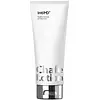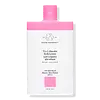What's inside
What's inside
 Key Ingredients
Key Ingredients

 Benefits
Benefits

 Concerns
Concerns

 Ingredients Side-by-side
Ingredients Side-by-side

Water
Skin ConditioningTapioca Starch
Propanediol
SolventCocos Nucifera Oil
MaskingSimmondsia Chinensis Seed Oil
EmollientAloe Barbadensis Leaf Juice
Skin ConditioningPhenoxyethanol
PreservativeCoco-Caprylate/Caprate
EmollientGlyceryl Acrylate/Acrylic Acid Copolymer
HumectantAminomethyl Propanol
BufferingEthylhexylglycerin
Skin ConditioningPolysorbate 60
EmulsifyingXanthan Gum
EmulsifyingTocopherol
AntioxidantParfum
MaskingWater
Skin ConditioningGlycolic Acid
BufferingCoconut Alkanes
EmollientSodium Hydroxide
BufferingHydroxyethyl Acrylate/Sodium Acryloyldimethyl Taurate Copolymer
Emulsion StabilisingPropanediol
SolventCetearyl Alcohol
EmollientSqualane
EmollientCetearyl Olivate
Sorbitan Olivate
EmulsifyingSclerocarya Birrea Seed Butter
EmollientButyrospermum Parkii Butter
Skin ConditioningCamellia Sinensis Seed Oil
HumectantPassiflora Edulis Seed Oil
EmollientNiacinamide
SmoothingSodium PCA
HumectantLactic Acid
BufferingTartaric Acid
BufferingSclerocarya Birrea Seed Oil
HumectantCocos Nucifera Fruit Juice
EmollientAdansonia Digitata Seed Oil
EmollientSchinziophyton Rautanenii Kernel Oil
EmollientCoco-Caprylate/Caprate
EmollientCitrullus Lanatus Seed Oil
EmollientCocos Nucifera Oil
MaskingTapioca Starch
Vitis Vinifera Juice Extract
AntioxidantPrunus Armeniaca Kernel Oil
MaskingSimmondsia Chinensis Seed Oil
EmollientXimenia Americana Seed Oil
EmollientSodium Hyaluronate Crosspolymer
HumectantAllantoin
Skin ConditioningQuercetin
AntioxidantLinoleic Acid
CleansingLinolenic Acid
CleansingPrunus Amygdalus Dulcis Oil
Skin ConditioningPersea Gratissima Oil
Skin ConditioningTocopherol
AntioxidantCitric Acid
BufferingSorbitan Isostearate
EmulsifyingPolysorbate 60
EmulsifyingChlorphenesin
AntimicrobialPhenoxyethanol
PreservativeCaprylyl Glycol
EmollientPotassium Sorbate
PreservativePentylene Glycol
Skin ConditioningSodium Carbonate
BufferingSodium Chloride
MaskingEthylhexylglycerin
Skin ConditioningWater, Glycolic Acid, Coconut Alkanes, Sodium Hydroxide, Hydroxyethyl Acrylate/Sodium Acryloyldimethyl Taurate Copolymer, Propanediol, Cetearyl Alcohol, Squalane, Cetearyl Olivate, Sorbitan Olivate, Sclerocarya Birrea Seed Butter, Butyrospermum Parkii Butter, Camellia Sinensis Seed Oil, Passiflora Edulis Seed Oil, Niacinamide, Sodium PCA, Lactic Acid, Tartaric Acid, Sclerocarya Birrea Seed Oil, Cocos Nucifera Fruit Juice, Adansonia Digitata Seed Oil, Schinziophyton Rautanenii Kernel Oil, Coco-Caprylate/Caprate, Citrullus Lanatus Seed Oil, Cocos Nucifera Oil, Tapioca Starch, Vitis Vinifera Juice Extract, Prunus Armeniaca Kernel Oil, Simmondsia Chinensis Seed Oil, Ximenia Americana Seed Oil, Sodium Hyaluronate Crosspolymer, Allantoin, Quercetin, Linoleic Acid, Linolenic Acid, Prunus Amygdalus Dulcis Oil, Persea Gratissima Oil, Tocopherol, Citric Acid, Sorbitan Isostearate, Polysorbate 60, Chlorphenesin, Phenoxyethanol, Caprylyl Glycol, Potassium Sorbate, Pentylene Glycol, Sodium Carbonate, Sodium Chloride, Ethylhexylglycerin
 Reviews
Reviews

Ingredients Explained
These ingredients are found in both products.
Ingredients higher up in an ingredient list are typically present in a larger amount.
Coco-Caprylate/Caprate is created from fatty coconut alcohol, caprylic acid, and capric acid.
It is a lightweight emollient. Emollients create a thin barrier on the skin to trap moisture in. This helps keep your skin hydrated and soft.
Once applied, Coco-Caprylate/Caprate is absorbed quickly and leaves a silky feel.
Coco-Caprylate/Caprate may not be fungal acne safe.
Learn more about Coco-Caprylate/CaprateCocos Nucifera Oil is obtained from the kernels of the coconut fruit. In other words, this is coconut oil.
Coconut Oil is rich in fatty acids with lauric acid making up the majority of these. It also contains linoleic acid. Due to this high fatty acid content, coconut oil helps trap moisture and soften skin.
Despite being antibacterial, coconut oil may not be great for acne-prone skin. It is comedogenic and may clog pores. This ingredient may not be safe for malassezia or fungal acne.
Note: Coconut Oil should not replace your sunscreen for UV protection. Studies show it only blocks about 20% of UV.
This oil is non-volatile and has a light scent.
The term 'fragrance' is not regulated in many countries. In many cases, it is up to the brand to define this term. For instance, many brands choose to label themselves as "fragrance-free" because they are not using synthetic fragrances. However, their products may still contain ingredients such as essential oils that are considered a fragrance.
Learn more about Cocos Nucifera OilEthylhexylglycerin (we can't pronounce this either) is commonly used as a preservative and skin softener. It is derived from glyceryl.
You might see Ethylhexylglycerin often paired with other preservatives such as phenoxyethanol. Ethylhexylglycerin has been found to increase the effectiveness of these other preservatives.
Phenoxyethanol is a preservative that has germicide, antimicrobial, and aromatic properties. Studies show that phenoxyethanol can prevent microbial growth. By itself, it has a scent that is similar to that of a rose.
It's often used in formulations along with Caprylyl Glycol to preserve the shelf life of products.
Polysorbate 60 is used to help stabilize products. It is a surfactant and emulsifier. These properties help keep ingredients together in a product. Surfactants help reduce surface tension between ingredients with different states, such as liquids and solids. Emulsifiers help prevent oils and waters from separating.
Polysorbate 60 is sorbitol-based and created from the ethoxylation of sorbitan. Ethoxylation is a chemical reaction used to add ethylene oxide. Sorbitan is a the dehydrated version of sorbitol, a sugar found in fruits.
In this case, the 60 comes from reacting 60 units of ethylene oxide with sorbitan.
Polysorbates are commonly used in medicine and foods.
Learn more about Polysorbate 60Propanediol is an all-star ingredient. It softens, hydrates, and smooths the skin.
It’s often used to:
Propanediol is not likely to cause sensitivity and considered safe to use. It is derived from corn or petroleum with a clear color and no scent.
Learn more about PropanediolThis oil comes from the seeds of the desert shrub called Jojoba. It is more commonly known as jojoba oil, a non-comedogenic oil.
Jojoba oil does not contain fragrance and has many fatty-acids, making it a great soothing ingredient.
It also contains Vitamin E, a great moisturizing ingredient. Vitamin E is also an antioxidant and protects your skin against oxidative damage.
This ingredient humectant properties, meaning it helps draw moisture from the air. This helps keep your skin hydrated.
While jojoba has antibacterial properties, it is only able to kill some strains of bacteria.
Studies also show it helps in wound healing. In fact, Indigenous cultures have used jojoba as a moisturizer and to help treat burns for centuries.
Fun fact: Jojoba oil similar to natural human skin sebum, so it has a great effect on dry skin. It is also promising with helping to regulate sebum production.
Due to its fatty acid content, Jojoba oil may not be fungal acne safe. We recommend speaking with a professional if you have any concerns.
Learn more about Simmondsia Chinensis Seed OilTapioca starch is a thickening agent and is made from the cassava root, also known as yucca.
According to a manufacturer, it is an excellent talc replacement.
It is gluten-free.
Learn more about Tapioca StarchTocopherol (also known as Vitamin E) is a common antioxidant used to help protect the skin from free-radicals and strengthen the skin barrier. It's also fat soluble - this means our skin is great at absorbing it.
Vitamin E also helps keep your natural skin lipids healthy. Your lipid skin barrier naturally consists of lipids, ceramides, and fatty acids. Vitamin E offers extra protection for your skin’s lipid barrier, keeping your skin healthy and nourished.
Another benefit is a bit of UV protection. Vitamin E helps reduce the damage caused by UVB rays. (It should not replace your sunscreen). Combining it with Vitamin C can decrease sunburned cells and hyperpigmentation after UV exposure.
You might have noticed Vitamin E + C often paired together. This is because it is great at stabilizing Vitamin C. Using the two together helps increase the effectiveness of both ingredients.
There are often claims that Vitamin E can reduce/prevent scarring, but these claims haven't been confirmed by scientific research.
Learn more about TocopherolWater. It's the most common cosmetic ingredient of all. You'll usually see it at the top of ingredient lists, meaning that it makes up the largest part of the product.
So why is it so popular? Water most often acts as a solvent - this means that it helps dissolve other ingredients into the formulation.
You'll also recognize water as that liquid we all need to stay alive. If you see this, drink a glass of water. Stay hydrated!
Learn more about Water